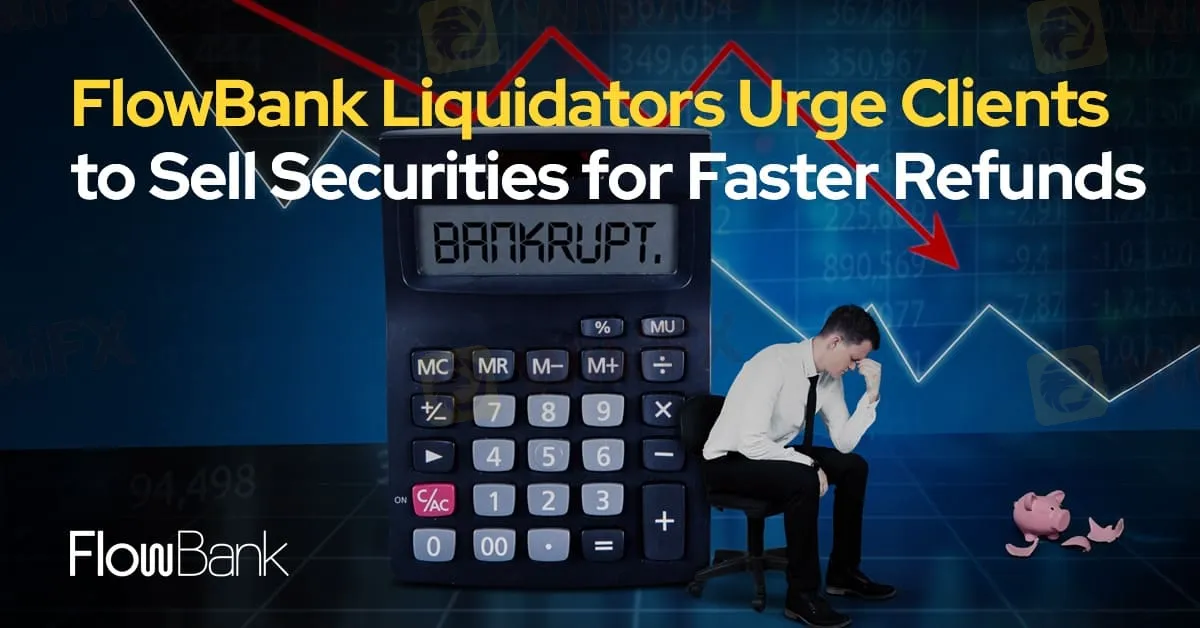简体中文
繁體中文
English
Pусский
日本語
ภาษาไทย
Tiếng Việt
Bahasa Indonesia
Español
हिन्दी
Filippiiniläinen
Français
Deutsch
Português
Türkçe
한국어
العربية
FlowBank Liquidators Urge Clients to Sell Securities for Faster Refunds
Abstract:Walder Wyss, the Swiss law firm overseeing the liquidation of bankrupt neobank FlowBank, has encouraged former clients to sell their securities held in accounts to expedite the refund process. Clients are able to log in to the FlowBank platform and complete the sale of their securities until 15th November 2024, after which the platform will no longer facilitate such transactions

Walder Wyss, the Swiss law firm overseeing the liquidation of bankrupt neobank FlowBank, has encouraged former clients to sell their securities held in accounts to expedite the refund process. Clients are able to log in to the FlowBank platform and complete the sale of their securities until 15th November 2024, after which the platform will no longer facilitate such transactions. This initiative aims to simplify the refund procedure and provide quicker access to funds, with the sale of assets seen as more efficient than transferring securities directly to clients.
The liquidators emphasized that direct transfer of securities to clients would involve significant time and cost. In contrast, converting securities to cash is a faster and simpler method, allowing for smoother disbursement of funds. Clients who opt for the sale can expect their refunds to be processed in a timely manner, while those who do not may face additional delays in receiving their assets.

Once a client‘s positions are sold, the resulting cash will be credited to a separate account before being transferred to a bank account designated by the client. The funds will be sent in either EUR or CHF, depending on the client's choice, and Walder Wyss indicated that these transfers will typically occur within a few days of the sale. However, during the first two weeks of the platform’s launch, manual or automated securities transfers will not be available, as the focus will be on completing sales.
FlowBanks downfall came after the Swiss financial regulator FINMA forced the company into bankruptcy in mid-June 2024. FINMA cited concerns that FlowBank had failed to maintain the minimum required capital for its business operations, with signs that the institution was over-indebted. Founded in 2020 by Charles-Henri Sabet, the company initially focused on providing banking and investment services before shifting its attention toward promoting online CFD trading, similar to Sabet's previous venture, London Capital Group (LCG).
FlowBank's minority owner, crypto investment company CoinShares, held a 30% stake in the neobank at the time of its collapse. While liquidation efforts continue, the liquidators are actively seeking a buyer for LCG, which remains a key unresolved aspect of the process.
This decisive move by Walder Wyss is seen as crucial for ensuring that FlowBanks clients can recover their assets without unnecessary delays, as the liquidation process progresses. Clients are advised to act promptly and take advantage of the streamlined solution to avoid prolonged waiting periods.

Disclaimer:
The views in this article only represent the author's personal views, and do not constitute investment advice on this platform. This platform does not guarantee the accuracy, completeness and timeliness of the information in the article, and will not be liable for any loss caused by the use of or reliance on the information in the article.
Read more

WikiFX Review: Is Ultima Markets Legit?
Ultima Markets has played a significant role in the forex trading industry for decades. WikiFX created a comprehensive review to help you better understand this broker. We will analyze its reliability based on specific information, regulations, etc. Let’s get into it.

WikiFX Review: Is FXTRADING.com still reliable?
FXTRADING.com is an online brokerage firm that offers trading services for various financial instruments such as forex, cryptocurrencies, shares, commodities, spot metals, energies, and indices. WikiFX has comprehensively reviewed this broker by analyzing its regulations, specific information, etc. so that you have a deep understanding of this broker.

Financial Educator “Spark Liang” Involved in an Investment Scam?!
A 54-year-old foreign woman lost her life savings of RM175,000 to an online investment scam that promised high returns within a short timeframe. The scam was orchestrated through a Facebook page named "Spark Liang."

The Hidden Checklist: Five Unconventional Steps to Vet Your Broker
Forex broker scams continue to evolve, employing new tactics to appear credible and mislead unsuspecting traders. Identifying these fraudulent schemes requires vigilance and strategies beyond the usual advice. Here are five effective methods to help traders assess the legitimacy of a forex broker and avoid potential pitfalls.
WikiFX Broker
Latest News
AIMS Broker Review
The Hidden Checklist: Five Unconventional Steps to Vet Your Broker
Russia to Fully Ban Crypto Mining in 10 Regions Starting January 1, 2025
YAMARKETS' Jingle Bells Christmas Offer!
Why is there so much exposure against PrimeX Capital?
Two Californians Indicted for $22 Million Crypto and NFT Fraud
WikiFX Review: Is Ultima Markets Legit?
Colorado Duo Accused of $8M Investment Fraud Scheme
MTrading’s 2025 "Welcome Bonus" is Here
Malaysia Pioneers Zakat Payments with Cryptocurrencies
Currency Calculator


